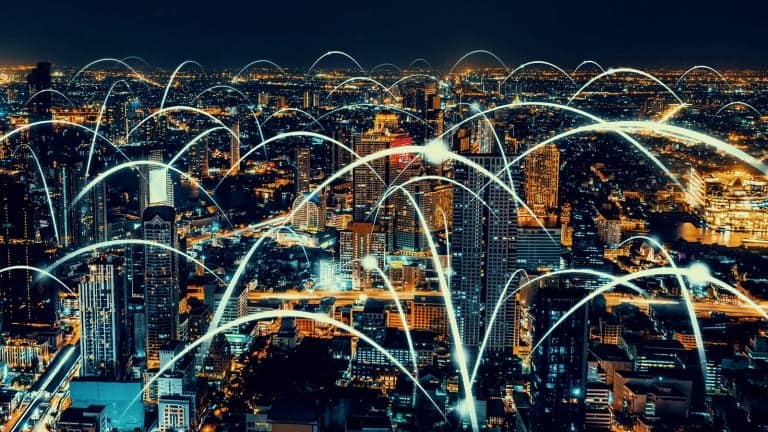Data and smart cities have opened up endless possibilities for managing urbanization challenges. The pre-requisite technologies for smart cities have also opened up endless possibilities for watching people, monitoring them, and perhaps giving authorities just a little bit of too much control over residents. For example, China is building hundreds of smart cities where data on the people and their movement is brought together to manage traffic congestion to rubbish collection, shopping, and suspicious behavior. But, at what point does efficiency become something more intrusive.
Table of Contents
ToggleAdvances in artificial intelligence, facial recognition, and big data in smart cities lead us to unprecedented surveillance levels. London used to be the most surveilled city globally, but today that title is held by Taiyuan in China with 120 public surveillance cameras per 1,000 inhabitants. 9 out of 10 of the most surveilled cities in the world are located in China.
(Image source: Statista.com)
While data and smart cities promise to make lives more comfortable and our societies better, is surveillance overreaching its limit by tracking, rating, and analyzing our every move? And, is the data of billions of people safe from criminals? Other key legal issues include:
- The lack of opportunity in a smart city environment for individuals to give explicit and meaningful consent to the processing of their personal information.
- The degree to which intelligent cities gather private information from unavoidable public interactions.
- The “privatization” of infrastructure and data ownership.
- The repurposing of “big data” extracted from the Internet of Things (IoT).
- Data storage in the Cloud.
Positive Aspects of Data and Smart Cities
There is no question that data and smart cities’ positive aspects far outweigh the privacy concerns. Numerous examples are available to demonstrate this fact.
In 2016, Hangzhou City implemented a system that can predict traffic flow ten minutes in advance with an accuracy of 90%. The traffic system also responds by switching traffic light patterns to reduce congestion and even sends SMS’s to commuters to help them with route planning. It also helps law enforcement track down criminals.
In the US and the UK, predictive police technics are being implemented. They use big data to forecast high crime probability areas and lamp posts equipped with microphones to listen to conversations. They can recognize trigger words and sounds and direct cameras to zoom in on the speakers.
One of the pioneers of this kind of technology was Xjera Labs in Singapore. In 2017, the company built a neural network that could find any individual, car, and object from video footage with a 97% accuracy within seconds.
Before data and smart cities, crime prevention was a nightmare. For example, surveillance involved a lot of human resources. Two or three men would follow individuals around, and they would rely on their ability to do that in real-time.
And, the benefits are in many areas, including health. For example, a few years ago, India started using smart city data management to locate infant mortality incidents in some of its cities. They then used this data to situate ambulances in strategic places and regions to take pregnant and nursing mothers to hospital in time. In doing so, they managed to decrease infant mortality by 50%.
Negative Aspects of Data and Smart Cities
Human rights groups in China’s Xinjiang region have raised concerns about surveillance. According to residents, all the surveillance measures have alienated the population rather than integrating it into Chinese society. Residents must install an app on their phones that scan for inappropriate content. China wants to implement a social credit system that sources citizens data-tracking what they buy, payback in loans, and post online. It accesses their integrity based on their daily activity.
Also, in the UK, despite data being successful at solving crime, there have been issues with civil liberties. For example, in Alum Rock, Birmingham, which has a sizeable Muslim population, the local West Midlands police spent millions of pounds on CCTV cameras, which were then targeted at Muslim areas. When the community found out, there were up in arms because the cameras breached their right to privacy under the Human Rights Act.
Still in the UK, the Government’s Prevent Campaign that was part of its counterterrorism strategy funded crime prevention cameras that were then used for surveillance purposes in mosques in Birmingham. This action has continued to create suspicion and friction between the government authorities and city residents – when you Google “Toxic Brand,” one of the top results is a news report about the UK government’s Prevent Strategy.
Data Security
The problem with data privacy isn’t just about how the data is used; it’s also about how the information is stored and secured. It isn’t only the good guys becoming more sophisticated; bad guys are upping their game. In a highly interconnected world, the risk of data loss accidentally or through crime multiplies exponentially. And, it goes just beyond stealing financial data from individuals.
The consequences of a city-wide hack could have world-ending repercussions. Terrorists could steal access codes to a Nuclear power station and overheat the reactor till it blows, or they could attack a rail transport system and send trains crashing into each other.
According to ABI Research, by 2024, there will be over 1.3 billion wide-area network smart city connections. Smart cities should incorporate the following features into their cybersecurity program:
- Data encryption: Encryption should not be an option; it must be mandatory. Encryption scrambles data rendering it useless and unreadable unless the user has the decryption key. So if criminals gain access to sensitive data, they cannot make head or tail. It is also best to implement multi-factor authentication together with encryption.
- Monitor security regularly: Security monitoring demands a dedicated team to monitor traffic and search for security anomalies. Security software can automate this by analyzing bulk data and scouting for compromise indicators. Upon risk detection, potential risk areas are isolated, blocking any data breaches.
- An extensive support platform: Any new support platform must secure a broad range of connected environments and devices. As smart cities consist of a myriad of networks, Infrastructure as a Service (IaaS), Software as a Service (SaaS), and cloud environments, security administrators should deploy a single comprehensive security system to ensure coverage of all security protection aspects.
Striking the Right Balance Between Data Privacy and Smart City Benefits
Data and smart cities can only have negative outcomes depending on the legal structures and the political structures. The starting point must always be that personal data is sacrosanct and must be protected. The system must make it possible for private citizens to give explicit consent whenever their data is used or processed. Data processors and controllers in a smart city environment must put in place measures that ensure the security and integrity of data. The legal system must impose stiff sanctions on any person or entity that violates privacy laws or, through negligence, allows personal data (including private organization data) to fall into the wrong hands.
Conclusion
In all instances where there has been a problem with data privacy and smart cities, it can be traced to a weakness in the legal system, lax security measures, or a repressive government, as aptly captured in the dystopian social science fiction novel by George Orwell, 1984. But, in an interesting twist, while the novelist had totalitarian governments in mind, regimes that don’t tolerate opposition and dissent of any kind, modern-day data privacy violators include democratic superpowers such as the US and UK, as revealed by whistleblower Edward Snowden. This recent trend calls for civic action to hold governments accountable and ensure that data privacy takes the central stage in policy making as the world transitions to smart cities.






